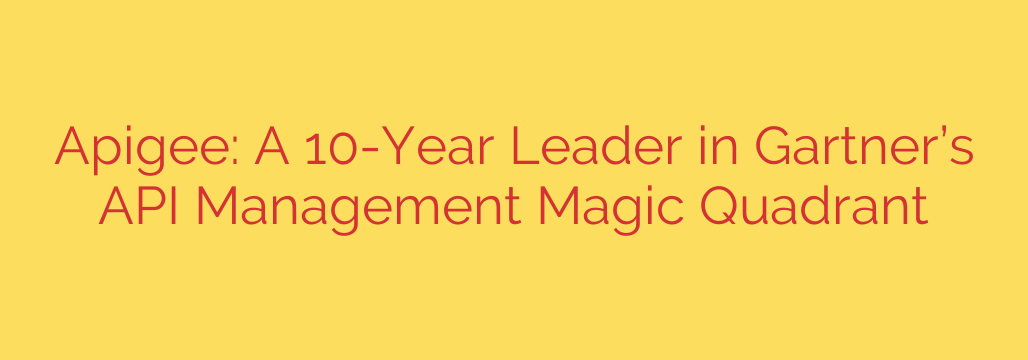
Decoding a Decade of Leadership in API Management: What It Means for Your Business
In today’s digital-first economy, Application Programming Interfaces (APIs) are not just a technical component; they are the backbone of modern business. They connect critical services, power mobile applications, and enable the seamless data exchange that customers now expect. As the number of APIs grows, managing them effectively becomes a mission-critical task. Choosing the right API management platform is a strategic decision that can determine the success of your digital initiatives.
When evaluating any technology, consistency is a key indicator of quality, reliability, and innovation. In the highly competitive world of API management, consistent leadership over many years signals a platform that not only meets current demands but also anticipates future trends. This long-term vision and proven ability to execute are what separate the leaders from the rest of the pack.
The Core Pillars of a Leading API Management Platform
A top-tier API management solution goes far beyond simply acting as a gateway. It provides a comprehensive suite of tools to handle the entire API lifecycle, ensuring security, performance, and strategic business alignment. The platforms that consistently lead the market excel in several key areas.
1. Comprehensive Full-Lifecycle API Management
Effective API strategy covers everything from initial design to eventual retirement. A leading platform must provide robust tools for every stage:
- Design and Development: Offering intuitive tools for designing, documenting, and testing APIs to ensure they are functional and developer-friendly.
- Publishing and Governance: Creating centralized developer portals where internal and external developers can discover, understand, and onboard with your APIs.
- Monitoring and Analytics: Providing deep visibility into API performance, usage patterns, and error rates to proactively address issues and optimize operations.
2. Advanced, Multi-Layered API Security
As APIs become the primary gateway to sensitive data and core business functions, security is paramount. An elite API management platform must offer more than basic authentication. It needs to provide a fortress of security features to protect against a growing landscape of threats.
Key security capabilities include:
- Identity and Access Management: Integration with industry standards like OAuth 2.0, OpenID Connect, and SAML.
- Threat Detection and Prevention: Proactively identifying and blocking common API attacks, such as SQL injection, cross-site scripting (XSS), and protection against malicious bots.
- Data Governance and Compliance: Enforcing data masking, encryption, and policies to meet regulatory requirements like GDPR and HIPAA.
Actionable Security Tip: Always implement a defense-in-depth strategy. Combine API keys and OAuth 2.0 with traffic management policies that prevent denial-of-service (DoS) attacks and sudden traffic spikes.
3. AI-Powered Analytics and Business Insights
Modern API platforms leverage artificial intelligence (AI) and machine learning (ML) to turn raw operational data into actionable business intelligence. This is a key differentiator that separates a basic tool from a strategic asset.
AI-powered capabilities can:
- Detect Anomalies: Automatically identify unusual traffic patterns that could indicate a security breach or a service outage.
- Predict Future Trends: Forecast API usage to help with capacity planning and resource allocation.
- Generate Business Insights: Correlate API usage with business outcomes, helping you understand which digital products are driving the most value.
4. Unmatched Scalability and Performance
A leading platform must be built to handle enterprise-grade workloads without breaking a sweat. Whether you’re serving a few thousand requests a day or billions, the platform must deliver low latency and high availability. This often means leveraging a global, cloud-native infrastructure that can scale on demand and ensure reliable performance for users anywhere in the world.
The Future is AI-Driven: Preparing for What’s Next
The next wave of digital transformation is being driven by generative AI. Leading API management platforms are not just observing this trend; they are actively integrating AI to enhance their capabilities. This includes using AI to help developers create APIs more quickly, automatically generate security policies, and provide even deeper insights from analytics.
Furthermore, these platforms are becoming the key to securely exposing and managing access to powerful generative AI models. Your API management strategy must account for how you will securely integrate AI services into your applications.
Choosing a Platform with a Proven Track Record
When selecting an API management platform, you are not just buying software; you are choosing a long-term strategic partner. A provider with a decade-long track record of leadership demonstrates a deep understanding of the market, a commitment to customer success, and the resources to innovate continuously.
Making the right choice means prioritizing a platform that is:
- Secure: Offers comprehensive, AI-enhanced security to protect your most valuable digital assets.
- Scalable: Can grow with your business and handle unpredictable demand.
- Insightful: Provides the analytics you need to make data-driven decisions.
- Future-Proof: Has a clear vision and roadmap that embraces emerging technologies like generative AI.
Ultimately, a consistent leader in API management provides the foundation of trust and reliability needed to build and scale a successful, long-term digital strategy.
Source: https://cloud.google.com/blog/products/ai-machine-learning/apigee-a-leader-in-2025-gartner-api-management-magic-quadrant/








